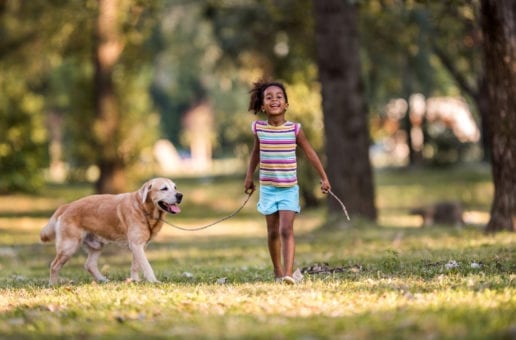A dog is a man’s best friend. They are loyal to their owners and are always so excited to greet their human companions when they arrive home. Approximately 90 million dogs live in the United States as pets and dogs not only act as loyal furry companions but also serve as guard dogs, and assist individuals who have both physical and mental disabilities. January is National Walk Your Dog Month, which is used to shed light on the importance of walking your dog, for both you and your canine’s mental and physical health. Research has shown that only 33% of dog owners rarely walk their dog. Most dogs spend their time in backyards and comfy homes however walking your dog is a significant part of being a responsible pet parent. Walking your dog on a regular basis (at least once a day) is not only beneficial to Fido but is also helpful to you. Studies have shown that for overweight people and overweight dogs, a 30-minute walk, three times per week can reduce blood pressure, increase energy, improve a sense of well-being, and lower your weight by 5% and your dog’s weight by 15%. Walking your dog is not only beneficial to both you and your dog’s physical health, but this activity is also known to improve your emotional and mental health as well.
Walking your dog decreases loneliness
Solitary walks (for the humans) or sitting in the backyard (for the dogs) can get pretty lonely. Quality walks with your four-legged pal can reduce feelings of loneliness for you and your dog. Dogs are social creatures, and they love new scents, meeting new people, and sniffing other dogs. Walking your dog improves their socialization with humans and other dogs and can help you meet new people, which can potentially turn into new and lasting friendships. Discovering new places with your dog can help you get out of your comfort zone and can feed your longing for adventure. Whether it is a walk in your neighborhood, exploring a new hiking trail or meeting up with friends or strangers for a dog-friendly social walk; being around your dog and others can prevent feelings of isolation, which can potentially develop into depression.
Walking your dog is beneficial to your mental health
Spending time on walks with your dog can reduce depression and anxiety. Humans have an innate instinct to touch and feel and to experience a physical connection with others. Dogs also share this fixed pattern of behavior, allowing a physical bond between humans and animals. This physical bond can strengthen the emotional relationships between dogs and their human companions. Walking is just one type of physical interaction that can enhance the human-animal bond. Hardened criminals have exhibited long-term behavioral changes after interacting with dogs in prison programs. For many prisoners, communication with the animals was their first experience with unconditional love and mutual affection.
Hugging and expressing love to your canine companion during a walk (or sitting on the couch at home) directly improves your mood. According to an article released in January 2011 by CNN Health, physical touch directly affects certain regions in the brain. The hypothalamus acts as the emotion center of the brain, and when physical activities, such as hugging or holding hands, chemical signals are fired directly from the hypothalamus to produce hormones in other areas of the brain that function to promote positive connections and bonding.
The best tips and tricks for walking your dog

• You are in charge: Use confident body language, head up, shoulders back, and do not let your dog walk in front of you. Your dog should walk beside you or slightly behind.
• Always be prepared: Always carry bags for cleaning up and disposing of dog waste, bring water for yourself and your dog, especially in warmer weather and do not forget to pack your dog’s favorite bite-sized treats for rewarding good behavior.
• Know your dog’s limits: How much walking time is enough for your dog? Factors to consider are your dog’s size (especially the length of his or her legs), breed, age, general health, and the walking environment. Keep an eye on your pup when you are out for a walk, if he starts panting and slowing down, you have gone far enough.
